4.1 Risk assessment
Risk management is an essential task for any company. A risk is any potential event that might prevent the organisation from achieving its objectives. Recent world events have changed the risks considered ten years ago. Madrileña Red de Gas (MRG) has adapted its risk assessment criteria to the new situation.
Madrileña Red de Gas has a robust system that is specifically adapted to the company and with a comprehensive focus by which risks can be identified and measured and/or checks can be selected and implements to identify, prevent, reduce or control the risks identified. MRG’s risk management is not limited solely to identifying events that pose a risk (defined as the materialisation of a threat), but also those that are an opportunity that the organisation can take advantage of.
MRG’s Risk Management Service will be overseen by the Corporate Risk Manager, who will coordinate the objectives and the information received from the risk managers of the different areas to the Risks Committee and the Risks and Audit Committee. The basic responsibilities of the Risk Management Service are:
- Define the strategy of the Risk Management Service and inform the rest of the organisation accordingly.
- Approve the MRG Catalogue of Risks, identifying and defining the main risks.
- Implement, monitor and follow up on approved action plans and maps.
At all times the Corporate Risk Director should maintain a position of objectivity, responsibility and independence, so that the service managed can achieve its objectives.
Madrileña Red de Gas has adopted its own methodological approach inspired by “Enterprise Risk Management” (and also known as COSO II) and by the ISO 31000 Risk Management standard. It has been standardised and documented in MRG’s internal standards, published in the digital document processing repository. This methodology allows for extra added value to be brought to all stakeholders while also making it possible to identify, create, capture and sustain the value of the company’s risk management.
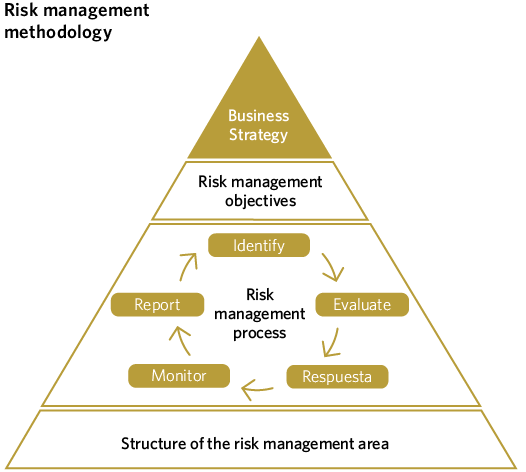
Recent world events have changed the risks considered ten years ago. MRG has adapted its risk assessment criteria to the new situation
According to MRG’s internal rules of procedure, the Audit and Risks Committee reports directly to the Board of Directors and operates in accordance with said rules, which define its objectives, functions and composition. This committee is made up of representatives from the four shareholders who sit on the Board of Directors, various members of the Executive Committee and the Risk Management Department.
Recurring topics discussed at the committee’s regular meetings include monitoring the map of corporate risks, the most relevant risks and the established or proposed checks and mitigation plans, accounts audits, audits of the integrated prevention, environment and quality system, matters relating to sustainability, the policy on the prevention of criminal offences and cyber security risks.
These activities mean that MRG is able to issue recommendations intended for risk management and/or for the Board of Directors. Additionally, as a result of COVID-19, monitoring how the specific risks map is evolving remains in place. This map sets out risks of a financial nature, such as the potential impacts on operating margins, liquidity and credit risk, as well as risks relating to difficulties in carrying out interventions in the homes of users affected by the pandemic, the availability of resources for the continuity of operations and/or failures in the supply chain, as well as monitoring the business continuity plan and job safety analysis.
Currently, the MRG Risks Map sets out the ten most common risks, which are evaluated by applying a criterion based on:
- The probability of a risk occurring, on a scale of one to ten.
- The combined effect on net present value and reputational impact, both on a scale of one to ten. The effect on net present value considers both the direct economic impact for the next 20 years and any possible sanctions.
This map sets out risks of a financial nature, such as the potential impacts on operating margins, liquidity and credit risk, as well as risks relating to difficulties in carrying out interventions in the homes of users affected by the pandemic, the availability of resources for the continuity of operations and/or failures in the supply chain, as well as monitoring the business continuity plan and job safety analysis.
The 2021 following corporate risk map for Madrileña Red de Gas shows the ten risks identified by category.
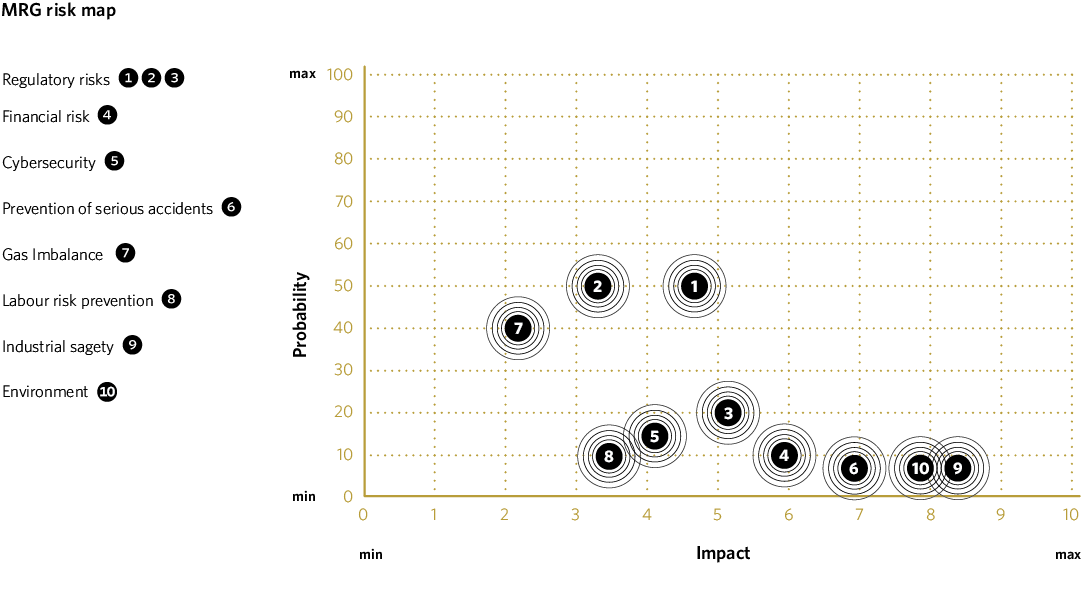
The map takes emerging risks into consideration through regular updates of its content.
It also adds new high-level checks to those already in place. The action plans implemented help to mitigate the consequences of these risks.
Madrileña Red de Gas has also conducted additional risk assessments to continue strengthening and maturing its environmental, social and governance (ESG) criteria:
- Governance risk assessment.
- Social risk assessment.
- Environmental risk assessment.
- Identify and assess risks in the climate change transition.
- Identify and assess physical risks caused by climate change.
4.2 Main challenges
The risk and opportunity analysis conducted by Madrileña Red de Gas is a decision-making tool we use to help us achieve our objectives. Our planet is facing a great many challenges when it comes to sustainability, and at MRG we have the necessary tools to make our contribution to sustainable development.
4.2.1 Climate change strategy
MRG includes climate change in its risk analysis, from two separate perspectives. On the one hand, it analyses the impact that the energy transition could have on the company, and on the other it considers the direct impact that rising temperatures and other climate phenomena could have on the company and on its infrastructures. The result of the assessment is the average risk from both perspectives, following analysis of the probability and effect of the impact.
Faced with this situation, at MRG we seek to be a company that is clearly committed to the fight against climate change and bring solutions to society.
We also seek to turn the current risk that the energy transition may pose into an opportunity for the company, by being prepared for regulatory and market changes, and gaining a reputation among the public, collaborating with them to achieve cleaner towns and cities, and clearly investing in renewable energy alternatives, such as hydrogen.
At MRG we seek to be a company that is clearly committed to the fight against climate change and bring solutions to society
| Legal and regulatory: increase in the price of emissions, in the reporting requirements, new regulations for products, etc. |
| Technological: replacing products with lower emissions, investments in failed R&D, cost of technology, etc. |
| Market: changes in consumer habits, uncertainty, higher MP cost, etc. |
| Reputation: changes in consumer preferences, stigmatisation of the sector, concern from stakeholders. |
| Possible risks relating sudden climate phenomena: flash flooding, hailstorms or heavy snowstorms. |
| Risk relating to chronic stress: stress from drought, probability of fires, higher average temperatures, etc. |
Madrileña Red de Gas is working on various courses of action aimed at combating climate change. We are involved in developing projects on green energy, which renewable gases are, for which more and more EU funding is being made available. We also support new sustainable mobility made possible by natural gas for vehicles (NGV), which is an increasingly interesting solution for professionals, large companies and SMEs, with which we enjoy a very solid relationship and which are key to the sector evolving, as well as forming part of GASNAM, the association of sustainable transport that encompasses the gas and hydrogen value chain in order to achieve the environmental, economic and operational challenges for transport by land, sea and air in Spain and Portugal. We also continue to help in improving air quality in our environment.
Plan Renove in the Madrid region
We have helped to improve air quality in the Region of Madrid by once again taking part in the plan to replace boilers in private residences, with one contribution of €110,000 and a second of €200,000, as part of the campaign specially designed to transform boiler rooms.
As a result, this year a total of 38 communal boiler rooms in our distribution area have been transformed (24 of them were coal-powered and in the city of Madrid itself), thus preventing a total of 2,700 metric tonnes of CO2* a year from being released.
* Estimate calculated based on emission figures published on the website www.miteco.gob.es/es
Liquefied petroleum gas (GLP) transformation plan
In recent years, Madrileña Red de Gas has pursued a transformation policy based on the objective costs of continuing to maintain each individual installation, working to transform liquefied petroleum gas (LPG) facilities with high running costs or needing almost a full replacement over to natural gas.
Our most immediate challenge, given the current situation of the LPG market, is to transform more than 15 thousand supply points over the next two years. We have been planning, measuring, budgeting and sizing up all the work that needs to be done to make sure we reach that target.
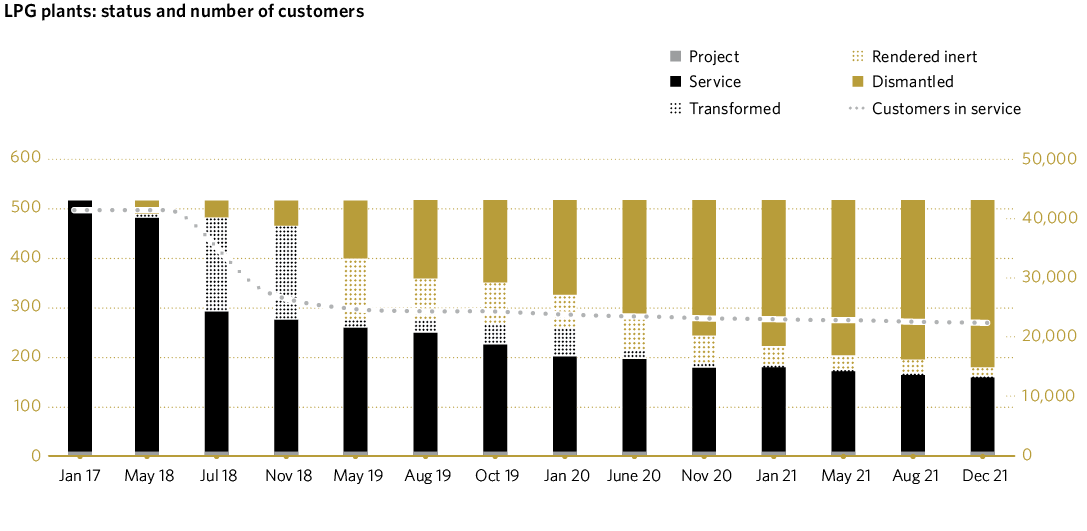
Transforming from liquefied petroleum gas (LPG) is a highly delicate activity, in which the different activities involved and the time scales needed must be carefully measured. It is also a highly intrusive process for the customer, as we need to modify and adapt the facilities and apparatus in their property. It is therefore extremely important to ensure there is full clarity in terms of the objectives and tasks to be carried out.
Madrileña Red de Gas has more than 386 km of propane gas pipelines, of which 74 will be completely renovated. The rest will be reused or cancelled and rendered inert, as the natural gas network is duplicated in these areas.
A new transformation contract has been awarded to eight leading companies in the sector, with a budget of more than €10 million for the works to reuse pipelines, adapt facilities, transform equipment and dismantle storage centres. In this regard, at Madrileña Red de Gas we have strengthened our expansion management team and implemented various IT developments.
Hydrogen is essential in achieving net zero
At Madrileña Red de Gas we are committed to a future in which the presence of hydrogen is seen positively on leading markets in the energy efficiency sector, which is why we are taking part in the Ready4H2 initiative, in which hydrogen plays the key role.
Ready4H2 is a new alliance of operators of local gas networks in different European countries designed so that they can develop and share their experiences in order to put the hydrogen transformation into practice. We are passionate about the role that hydrogen and other green gases can play to reach net zero.
Local networks are crucial to the initiative’s success, for the following reasons:
- Converting all the natural gas that Ready4H2 members distribute to their customer into hydrogen or other green gases would reduce the amount of CO2 released into the atmosphere by millions of tonnes.
- Most industrial and commercial facilities connected to gas are supplied by local gas networks rather than from pipelines in the national transmission system.
- Most of the length of the Ready4H2 members’ pipelines are ready to be converted.
- Even for short distances, it costs four times less to distribute hydrogen by pipeline than by road tanker. Transport by road tanker would be impossible to supply the volumes required by millions of people.
- Most members of the Ready4H2 initiative also supply electricity to local users. We understand the benefits and challenges of gas and electricity networks, and the opportunities of hydrogen and other green gases to combine them in the most effective way and make better use of the growing renewable resources available in Spain.
Our aim is to facilitate the production of central and local hydrogen and integrate the decarbonised energy, gas and heating markets, but we need suitable regulation to do so.
These regulatory barriers need to be overcome so that hydrogen and other green gases can quickly and effectively reduce our customers’ carbon footprint.
The gas infrastructure can manage a variable renewable energy production in a position of strong growth. The specific climate conditions (lack of wind, cloud cover, and seasonal changes in terms of availability of sunshine) can lead to a sustained reduction in the generation of wind and solar power. Europe regularly experiences weeks of cloudy weather in winter, with little wind. This occurs several times a year on average, for days in a row.
To guarantee an uninterruptible power supply during these periods, a fast, large-scale quick and lasting storage capacity is needed, which is provided by large-scale underground storage facilities connected to gas pipelines. Gas storage in many European countries is sufficient to meet gas demand for three months, whereas stored electricity can only meet less than one day’s demand for electricity.
Many of these gas storage facilities can be reused for hydrogen, guaranteeing consumers a continuous supply of hydrogen gas. Facilities that work with hydrogen do not overload the electrical system, which reduces the risk of power outages. In this case, the gas infrastructure can strengthen the hydrogen supply chain and support the production and use of renewable energy.
Local gas networks are flexible centres that act as the link between supply and demand, and are ready to be converted to hydrogen.
* Accurate figures for the project, and other information, can be viewed on the project’s website: https://www.ready4h2.com/
Converting all the natural gas that Ready4H2 members distribute to their customer into hydrogen or other green gases would reduce the amount of CO2 released into the atmosphere by millions of tonnes
4.2.2 Cyber security
Cyber security is the practice of protecting systems, networks and software from digital attacks. Cyber attacks are generally aimed at accessing, modifying or destroying confidential information. Digital security measures need to be implemented because there are more devices connected than people, and attackers are growing in numbers and becoming more creative.
In an organisation, the people, processes and technology should complement one another to create an effective defence against cyber attacks. Organisations also need to have a structure in place to handle tentative and suspicious cyber attacks. A good structure is needed that can be used as a guide and to explain how to identify attacks, protect systems, detect and respond to threats, and recover after a successful attack.
At MRG we keep a close watch on how cyber attacks evolve, ensuring we implement best practice in our strategies to prevent and react to any security risks that arise in our IT and OT networks.
Various courses of action have been established in this regard:
- Form a specialist cyber security team, backed by significant investment, to carry out the courses of action set out in our Cyber Security Management Plan.
- Implement a model of governance consisting of cyber security specialists and representatives from all of the various business areas.
- Prepare a comprehensive prevention and action framework to deal with threats by activating a Security Operations Centre (SOC) and a Security Information and Event Management (SIEM) solution.
- Review and improve the body of security regulations, and formalise a security incident management framework.
- People: train everyone in the company on matters of cyber security through specific courses depending on each staff member’s profile and level of risk. Users should understand and observe basic data security principles, such as choosing secure passwords, being cautious with files attached to emails and backing up data.

Personal data protection
Our data protection management model is well established and complies with Regulation (EU) 2016/679 of the European Parliament and of the Council, the new General Data Protection Regulation (GDPR) and Spanish Law 3/2018. In 2021, Madrileña Red de Gas decided to take its data protection a step further and implement an information security management system, based on the ISO 27001 standard, an initiative that is fully aligned with the current integrated management system and which will provide cover for the current personal data protection model.
Managing the rights of those affected, managing incidents and resolving queries, many of which relate to how current legislation is interpreted and to individuals exercising their personal data protection rights, are the most relevant data protection management activities carried out in 2021.
The MRG Data Protection Officer is the highest authority on this matter and has an active role on the Executive Committee, the Risks and Audit Committee and the Cyber Security Committee.
Our data protection model is based on the structure of the ISO management systems, so it can take suitable advantage of the existing synergies with other systems in place, which will facilitate final alignment with the ISO 27001 standard.
In accordance with the information security and data protection policy, we have a management manual that has been developed according to more than a dozen personal data protection procedures, which are subject to regular revisions.
By implementing the risk and impact assessment model for the different ways in which data protection is handled, data protection management has been organised according to the priorities and opportunities identified, such as, for example, the policies relating to identifying the parties concerned.
The management model interacts with the parties concerned in the following ways:
- Publish the personal data protection policy and information on how personal data is processed on the company’s website to ensure stakeholders were kept up to date. Users are also informed of the availability of this information in the various ways that we communicate with them.
- Active management of the data protection officer’s mailbox, which received a significant number of queries.
The following lines of action are also fully integrated into our management model:- Actions to coordinate business activities on matters relating to data protection with data processor managers, through meetings, unifying criteria and best practice agreements.
- Monitoring the data protection performance of our chain of suppliers, through the information provided by the external IT system on the maturity of their privacy policies, as well as through the auditing reports issued by the external IT system.
- Interaction with the Spanish Data Protection Agency with regard to various processes involved in protecting individuals’ rights.
- Record of data protection incidents, which are investigated to help introduce improvements to how information is managed.
Madrileña Red de Gas decided to take its data protection a step further and implement an information security management system, based on the ISO 27001 standard
It is commonplace to review personal data protection clauses in service provision agreements to make any necessary adjustments to ensure a base level of alignment with our policy.
Recent developments compared with previous years include the following:
- A significant increase in queries about personal data protection.
- Nine personal data protection incidents were recorded; none of them led to a breach of data protection security, but the investigations carried out made it clear that improvements needed to be incorporated into how personal data was managed and processed.
- The courts rejected the only sanction proposed by the AEPD relating to data protection that has been recorded since the company began.
Furthermore, and with the aim of promoting our internal culture with regard to data protection, the MRG internal regulation library released information on revisions and updates made over the course of the year, ensuring the documentation that it contains remains up to date.
4.2.2 Major accidents
At Madrileña Red de Gas our facilities include liquefied petroleum gas (LPG) plants. LPG is a mixture of liquefied gases (butane and propane) derived from oil. It is classed as a dangerous substance and governed by Royal Decree 840/2015 for plants with a storage capacity of 50 tonnes or more.
To meet the requirements set out in said legislation, for the past five years Madrileña Red de Gas has had a management system in place aimed at preventing major accidents, and which forms part of the company’s Integrated Management System.
To that end, we created the Major Accident Prevention Committee, which is the company’s highest authority on matters relating to the prevention of major accidents. Its functions are as follows:
- Disseminate the criteria adopted by the working groups on major accident prevention.
- Approve the major accident prevention objectives.
- Verify that the criteria adopted are being monitored correctly and that the objectives set are being observed.
- Oversee the circulation and observance of the major accident prevention policy.
- Ensure that there is appropriate monitoring of processes, breaches, and corrective, preventive and improvement actions.
- Ensure that the System Review Report is produced and taken into account.
- Encourage process-driven management, including how processes related to one another, and identifying and proactively prioritising opportunities for improvement in the prevention of major accidents that can increase the capacity of these processes to obtain results.
- Foster staff involvement by creating improvement teams, assigning the necessary resources for them to work effectively.
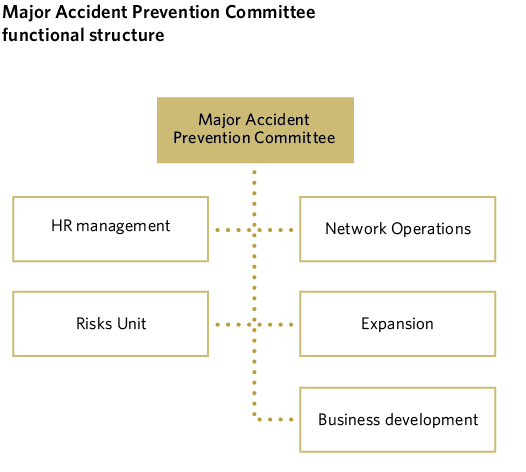
On matters of self-protection and emergencies, the following significant actions were taken: completion of the self-protection plan for LPG plants, and the emergency plans for the five LNG plants were updated
The Committee meets at least once a year, holding separate or joint sessions for each management area that has synergies with this system.
Historically, prevention management has focused on the various activities relating to maintenance, implementing interior emergency plans, internal audits, regulatory inspections and notifying the appropriate authorities.
In 2019, an initial cycle of managing the major accident prevention model was completed that included dangerous substances, and a second cycle was initiated with document reviews, among other courses of action.
In 2021 we moved forward in this second cycle with a range of different courses of action. On matters of self-protection and emergencies, the following significant actions were taken: completion of the self-protection plan for LPG plants, and the emergency plans for the five LNG plants were updated.
The second management cycle was also continued for assets affected by the regulations of Royal Decree 840/2015 Seveso III, bringing to a close the review of eight interior emergency plans for LPG plants with storage capacities of more than 50 tonnes, with five regulatory inspections carried out.
In relation to the objective established the previous year regarding maintaining the major accident prevention management model (SEVESO III), this was completed with 100% compliance and all targets reached with regard to emergency plans and regulatory revisions.
4.2.2Ethical behaviour
For Madrileña Red de Gas corporate responsibility is fully integrated into its strategy and positioning, forming part of our values. We are aware that the acceptance and economic success of the company can only be sustainable if it makes an active, credible and tangible contribution to the result of the challenges facing our society. Accordingly, the senior management of Madrileña Red de Gas has established good governance criteria for the company and a code of ethics that must be observed by all employees as a way to achieve these results.
Code of Ethics
The Code of Ethics is intended to establish the guidelines that will guide the ethical behaviour of all company employees in their daily work, with regard to the relations and interactions that they have with all stakeholders, i.e. employees, customers, suppliers and external collaborators, shareholders, public and private institutions, and society as a whole.
This Code is inspired by the definition of the Mission, Vision, Values of Madrileña Red de Gas, which it complements and stands as a model of the necessary actions to ensure suitable behaviour in the professional activities of our employees.
The Code of Ethics applies to everyone at MRG, regardless of their position or where they work.
Madrileña Red de Gas will also promote and encourage the suppliers and companies that it collaborates with in order to adopt behaviour guidelines that are consistent with this Code of Ethics.
The main functions of the MRG Code of Ethics Committee are as follows:
- Foster the circulation, knowledge of and observance of the Code of Ethics.
- Interpret the Code of Ethics and steer actions appropriately in the event of any doubt.
- Facilitate the resolution of any conflicts in which the Code of Ethics applies.
- Facilitate and manage a channel of communication for all employees, suppliers and collaborator companies so that they can, in good faith, ask about or report breaches of the Code of Ethics or any related information, without fear of reprisals.
- Produce reports for the governing bodies on the dissemination and observance of the Code of Ethics and the activities of the Committee itself, producing appropriate recommendations or proposals to ensure it is up to date, improve its content and facilitate the application of aspects requiring particular consideration.
- Oversee observance of the Code of Ethics, and as appropriate analyse signs and reports relating to possible breaches of the code.
Complaints channel
An external and independent complaints channel has been implemented as one of the tools by which situations can be identified, and action can be taken, in the event of any breaches of legislation and/or practices that contravene the values and principles established in MRG’s code of ethics and anti-corruption policy. This channel ensures that reports can be made anonymously by staff or by third parties related to the company to its Code of Ethics Committee, or to a body appointed for this purpose. This means that reports can be made with a guarantee of confidentiality and no fear of reprisals, of any irregularity or behaviours that is in breach of the law, the Code of Ethics or the Anti-Corruption Policy.
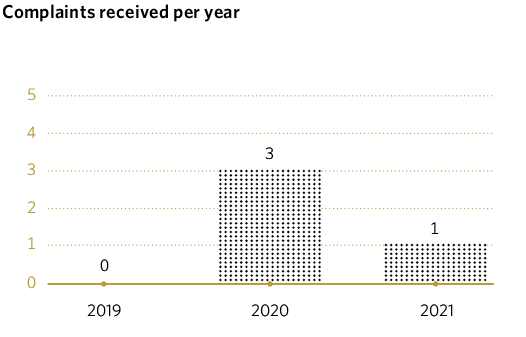
EThrough the Complaints Channel, reports can be made with a guarantee of confidentiality and no fear of reprisals, of any irregularity or behaviours that is in breach of the law, the Code of Ethics or the Anti-Corruption Policy
This channel is available online (https://www.canaldedenuncias.com/es/madrilena). In 2021 it was available and operative 100% of the time.
In 2021 only one report was received, in December; two fewer than in the previous year. Said report was closed in the same year with a satisfactory outcome.
Reports received through the Complaints Channel are discussed and analysed by the Code of Ethics Committee and depending on their content are distributed to the appropriate area with the agreed considerations.
Preventing corruption and conflicts of interest
Madrileña Red de Gas is committed to combating corruption in all forms, and to developing specific practices to prevent it. It has therefore established an Anti-Corruption Policy. In this regard, Madrileña Red de Gas opposes exerting an influence on the will of people who do not form part of the company in order to obtain a particular advantage through the use of unethical practices, and no employee or professional of our company may accept or give, directly or indirectly, any payments, gifts or considerations of any kind in an attempt to exert undue influence on any commercial, professional or administrative relations, for both public and private organisations.
With this purpose, a compliance system has been implemented, overseen by the Board of Directors through the Risks and Audit Committee, which helps to prevent or mitigates as far as is possible the risk of any unlawful activity taking place in our organisation, including the offence of corruption. To date, no cases of corruption have been detected.
Should any conflict of interests be detected, members must inform the Board of Directors and the company itself. Any such report is documented and included in the company’s report. Additionally, as established by the Capital Companies Act, for any cases in which a possible future conflict of interests is expected to arise, article 230 of said legal text sets out the procedure to deal with individual cases, which depending on the particular case will be by the Board itself or, in this case, by the sole shareholder.
Protocol for preventing criminal offences
Within the framework of the compliance system, and as a result of the risk analysis conducted at Madrileña Red de Gas, we have defined and internally distributed a protocol indicating the company’s areas of operating and the particular activities that are most vulnerable to criminal offences being committed that could be prevented. At Madrileña Red de Gas we undertake to submit the protocol to permanent review depending on the analysis and monitoring performed by the Risks and Audit Committee.
All agreements with suppliers and contractors include penalty clauses on legal compliance and criminal liability. These agreements require compliance with the law at all levels, in terms of both labour laws
Criminal Offence Prevention Committee
Madrileña Red de Gas has a criminal offence prevention committee made up of the chairman of the Board of Directors, the managing director and the compliance officer, with the following objectives:
- Review existing policies and ensure constant compliance with legislative developments relating to risk prevention.
- Adapt established controls so that any risks detected are reduced as much as it is possible to do so.
- Review employee training programmes, giving consideration to new developments in this area or as refreshers.
The committee meets once a year, before the Risks and Audit Committee is held, and in which the annual Compliance Report is submitted for approval.
In this annual meeting, an evaluation is given of the actions taken within the framework of the compliance system, and action plans proposed by the compliance officer, initiatives for improvements to be implemented during the year in progress and proposals to review existing crime prevention policies and training programmes on this issue are submitted for approval. In the event of any breaches or specific needs, an impromptu meeting is convened on the matter to address it and propose a solution.
Training, raising awareness and commitment
To determine the training needs on the prevention of criminal offences, how the company’s various bodies are constituted has been taken into account. MRG has a Chairman and a Non-Executive Board of Directors, who have given their approval for a criminal compliance officer to be assigned who will be entrusted with these duties, as the body tasked with approving criminal offence prevention and anti-corruption policies, the annual compliance review report and the annual action plans with the specific needs detected, among others, providing general and specific training as appropriate relating to preventing criminal offences, aimed the company’s executive governing bodies (Managing Director, area directors and heads of department) and the rest of the workforce, as the aim of compliance training is to ensure that all of the company’s employees and executive bodies perform their roles and their positions in a way that is consistent with the organisation’s compliance culture, in line with the criteria designed and approved by the Board of Directors.
- Basic compliance training: basic training on the prevention of criminal offences provided for all staff regardless of their role and their hierarchy. Currently given when staff join the company as part of their induction. The course has a duration of 1.5 hours and is given entirely online. Its effectiveness is gauged by means of a questionnaire on the knowledge acquired. Six out of seven staff members joining the company completed the training in 2021.
- Specific training on the prevention of money laundering and the funding of terrorism: only financial department, CEO, directors and department heads. The course has a duration of one hour and was given entirely online. Its effectiveness is gauged using a questionnaire on the knowledge acquired. This training was launched in 2020, and was completed by 29 employees.
Similarly, all agreements with suppliers and contractors include penalty clauses on legal compliance and criminal liability. These agreements require compliance with the law at all levels, in terms of both labour laws (job safety analysis, quotations, compulsory training for the particular activity, etc.) and business laws (fiscal compliance, accreditation for the activity, etc.).
* Point 2.4 includes a detailed description of the company’s governing bodies with regard to anti-corruption and the prevention of criminal offences.
Procedure to deal with harassment and violence in the workplace
The International Labour Organisation (ILO) defines harassment in the world of work as “repeated actions and practices directed against one or more workers that cause humiliation, offence and distress”.
In order to provide a suitable framework of protection for workers against any risks in the workplace associated with situations involving assault or violence, Madrileña Red de Gas has had a specific procedure in place since March 2013.
Our company’s Code of Ethics rejects behaviour of this kind and the values and principles established in it must be observed. We have designed the company’s organisation in line with general recommendations for the prevention of psychosocial risks. We also carry out training and education on preventing psychosocial risks and conflict resolution, aimed particularly at team managers, so that they might recognise and prevent any possible conflicts at their source.
In 2021 we had no cases of harassment or violence in the workplace
4.2 Financial information
Madrileña Red de Gas has shown great stability and financial resilience, obtaining excellent results despite the global pandemic against which 2020 and 2021 must be measured, confirming the company’s solid position and reliability in its ability to generate income.
In 2021 turnover was €186.8 million, a 6% increase over the company’s 2020 figures (€176.2 million). The EBITDA of €141.3 million is a 1% increase over the figure for 2020 (€139.7 million).
MRG’s main source of revenue is turnover from its distribution activity, which is calculated each year using a parametric formula and varies depending on the growth in supply points and the demand conveyed through the network.
A total of 99% of customers connected to the company’s network are residential. This means that the company has remained stable in the face of economic cycles, as the temperatures in the colder months are what have the greatest impact on the final figure of the remuneration received. In 2021 temperatures in the Madrid region were higher than in 2020, and this is the main factor behind the increase in revenue from distribution payments.
The rise in other forms of income is due to the activity involved in carrying out regular inspections, which must be carried out every five years at every supply point in the company’s network, and inspection appointments are not spread out evenly across the five years. More inspections needed to be conducted in 2021 than in 2020, which is the main reason behind the increase in other revenue.
The company’s growth strategy continues to focus on profitable and sustainable expansion both in our region and in adjacent areas. The company’s customer base continues to grow.
As of the close of 2021, Madrileña Red de Gas distributes gas to 915,209 supply points, of which 893,311 are for natural gas and 21,898 are for liquefied petroleum gas.
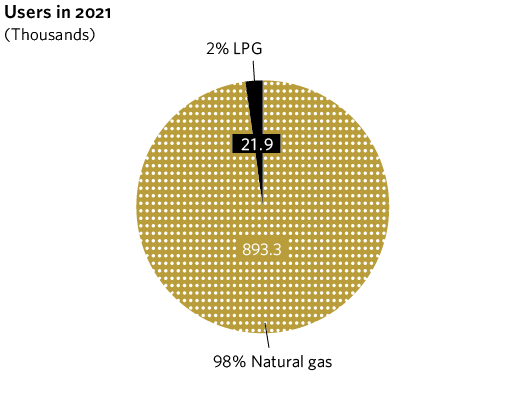
MRG’s main business is the distribution of natural gas, which is a regulated activity. The regulatory periods for this activity are in six-year cycles.
The period that began in 2014, at a time of great stability, had its last year in 2020. A new period began in 2021, and the regulatory framework has already been defined. Over the course of 2020 the methodology used to calculate remuneration was published. It the same approach as previously, but also includes a gradual offset of revenue over the period. The offset finally published for MRG means an average cut of 10% in the regulatory period now under way, a similar figure to that applied to the main companies in the sector.
The consortium of company shareholders did not change in 2021. For them, MRG represents a long-term value creation project where they share the same strategic vision and a commitment to stable, long-lasting financial strength.
Indeed, financial strength is one of the company’s mainstays, and MRG strives to maintain strong levels of solvency and liquidity consistent with the degree of investment to which the company is committed, balancing the cash-flow-to-debt ratio.
The company has strong levels of solvency and liquidity consistent with an investment grade rating. The financial structure is efficient and long-term.
In 2021, gross debt amounted to €951.8 million, with an average cost of 2.7%.
The company also has a contingent line of credit amounting to €75 million, which was renewed in February 2022 until February 2025, with the aim of achieving efficiencies in the financial infrastructure by adjusting the sum of said credit to the real needs of the company for the coming years.
Flexibility in the company’s dividend policy is another feature that ensures MRG is able to enjoy a better financial position.
The group’s debt is issued by Madrileña Rede Gas Finance, B.V., in the regulated Luxembourg market under a euro medium-term note (EMTN) programme. This debt is classed as investment grade (BBB-) by S&P Global Ratings and the Better Business Bureau (BBB), and as (low) by the DBRS Morningstar rating agency.
Net turnover in the year ending 31 December 2021 was €186.8 million (€176.2 million in 2020), of which €171.3 million is from natural gas, and the rest (€15.5 million) from LPG.
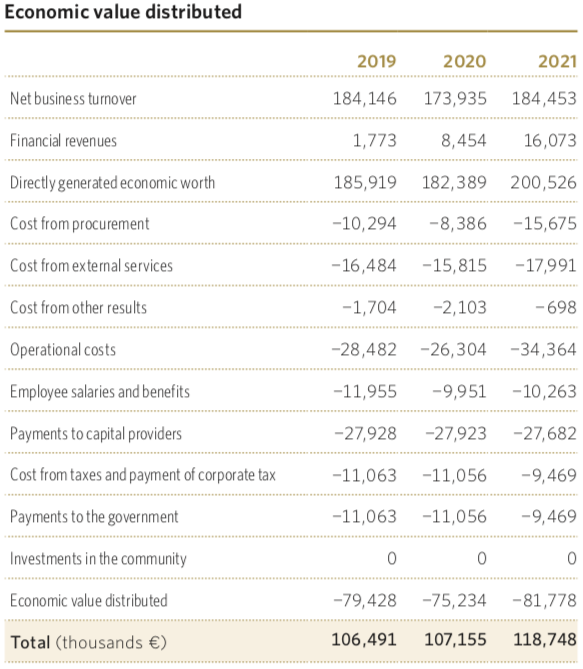
Within MRG’s natural gas revenue, 85% came from regulated remuneration from distribution, consisting of the figure set by the Resolution of 11 February and 20 May 2021 by the National Commission on Financial Markets and Competition, and the best estimate for payment made by the company’s senior management. The remaining 15% is from other services related to natural gas distribution, such as rental of meters, regular inspections and other consumer services.
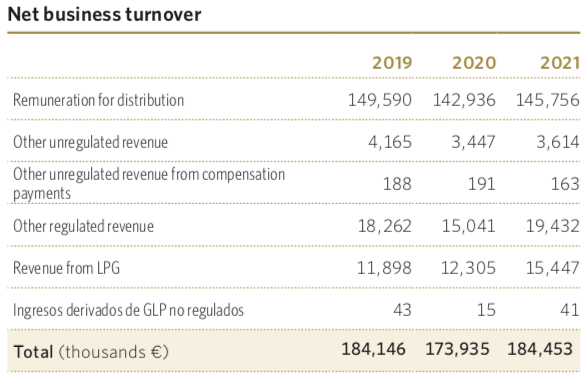
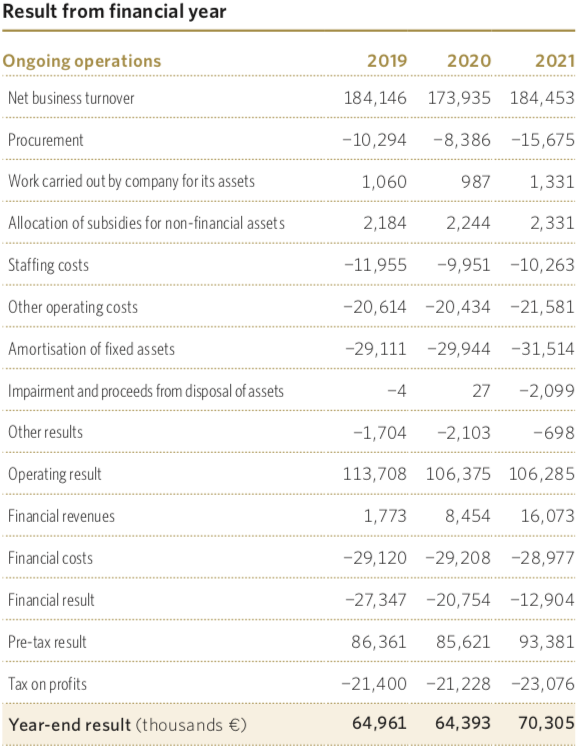
The full amount of the company’s turnover comes from activities conducted in the Region of Madrid (currently 61 municipalities).
Other regulated income is from services connected to the distribution of natural gas, the prices for which are regulated.
These services include the gas meter rentals, regular inspections and connection services.
Non-regulated revenue also comes from services connected to our natural gas distribution activity, such as those resulting from operations conducted in end users’ homes and other auxiliary services.
Within MRG’s natural gas revenue, 85% came from regulated remuneration from distribution
The financial indicator EBITDA (earnings before interest, taxes, depreciation and amortisation) shows the company’s profit before subtracting the interest it must pay for debt incurred, the taxes it must pay, depreciations relating to the company and the amortisation of any investments made. The EBITDA shows a true and fair image of what the company is earning. In 2021, this was more than in 2020, and close to the figure for 2019.
| 2019 | 2020 | 2021 | |
| Total EBITDA (thousands €) | 146,079 | 139,721 | 141,318 |
| Operating result | 113,708 | 106,375 | 106,285 |
| Amortisations | 29,111 | 29,944 | 31,514 |
| Other results | 1,704 | 2,103 | 698 |
| Excess provisions | 0 | 0 | 0 |
| Losses, impairment and change in provisions | 17 | 659 | -326 |
| Compensation payments | 1,312 | 280 | 636 |
| Cost from bank services | 223 | 387 | 412 |
| Impairment of goods, raw materials and others | 0 | 0 | 0 |
| Impairment and proceeds from disposal of assets | 4 | -27 | 2.099 |
Consolidated Tax Group structure
Since 1 July 2015 the company is taxed on a consolidated tax return system as a controlled entity of Tax Group no. 474/15, the parent company of which is Elisandra Spain IV, S.L.
Consolidated Tax Group no. 474/15 is made up of Elisandra Spain IV, S.L., as the parent company, and the companies Elisandra Spain V, S.L.U, Aliara Energía, S.L.U., Aliara GLP, S.L.U. (founded in November 2021) and Madrileña Red de Gas S.A.U.
